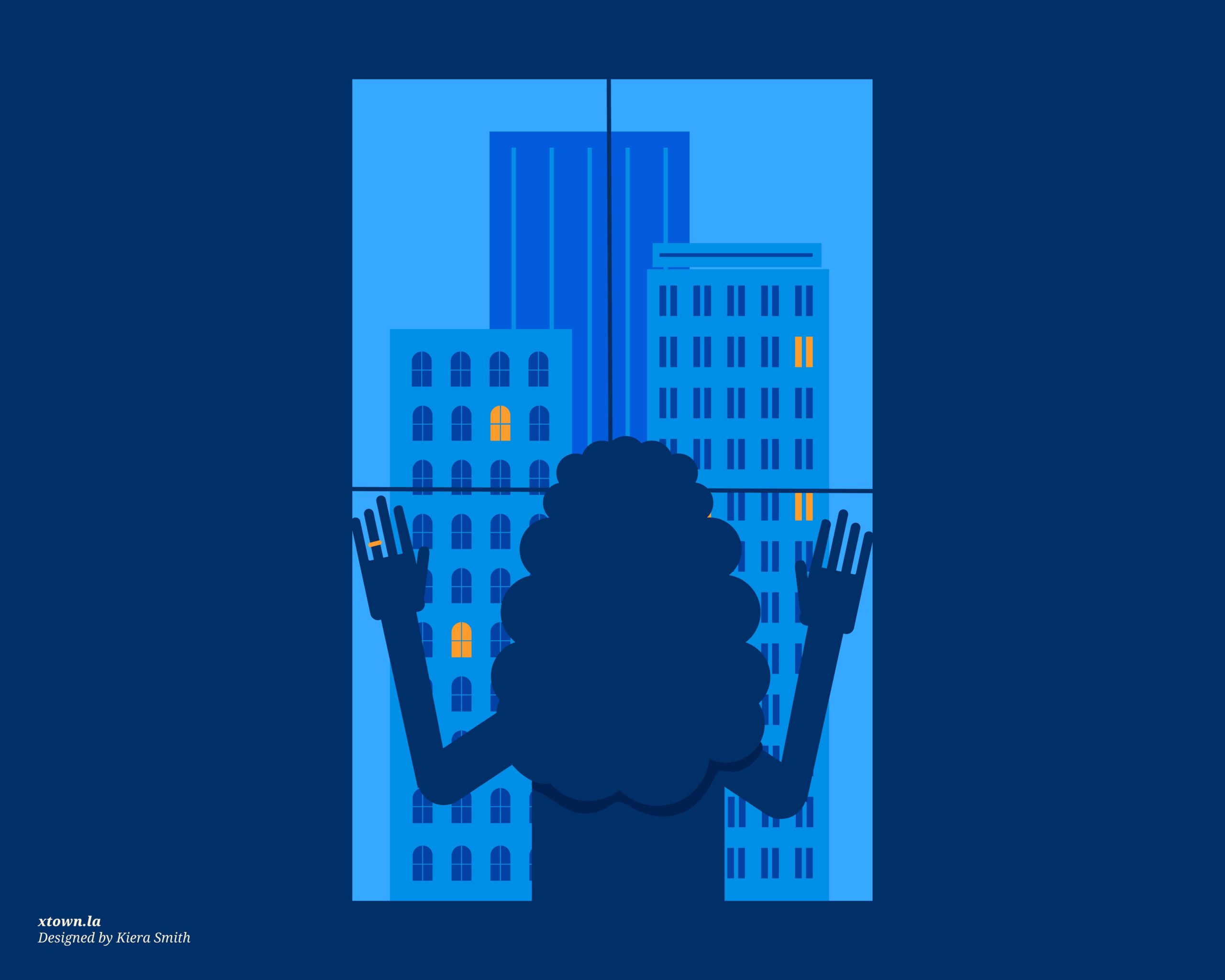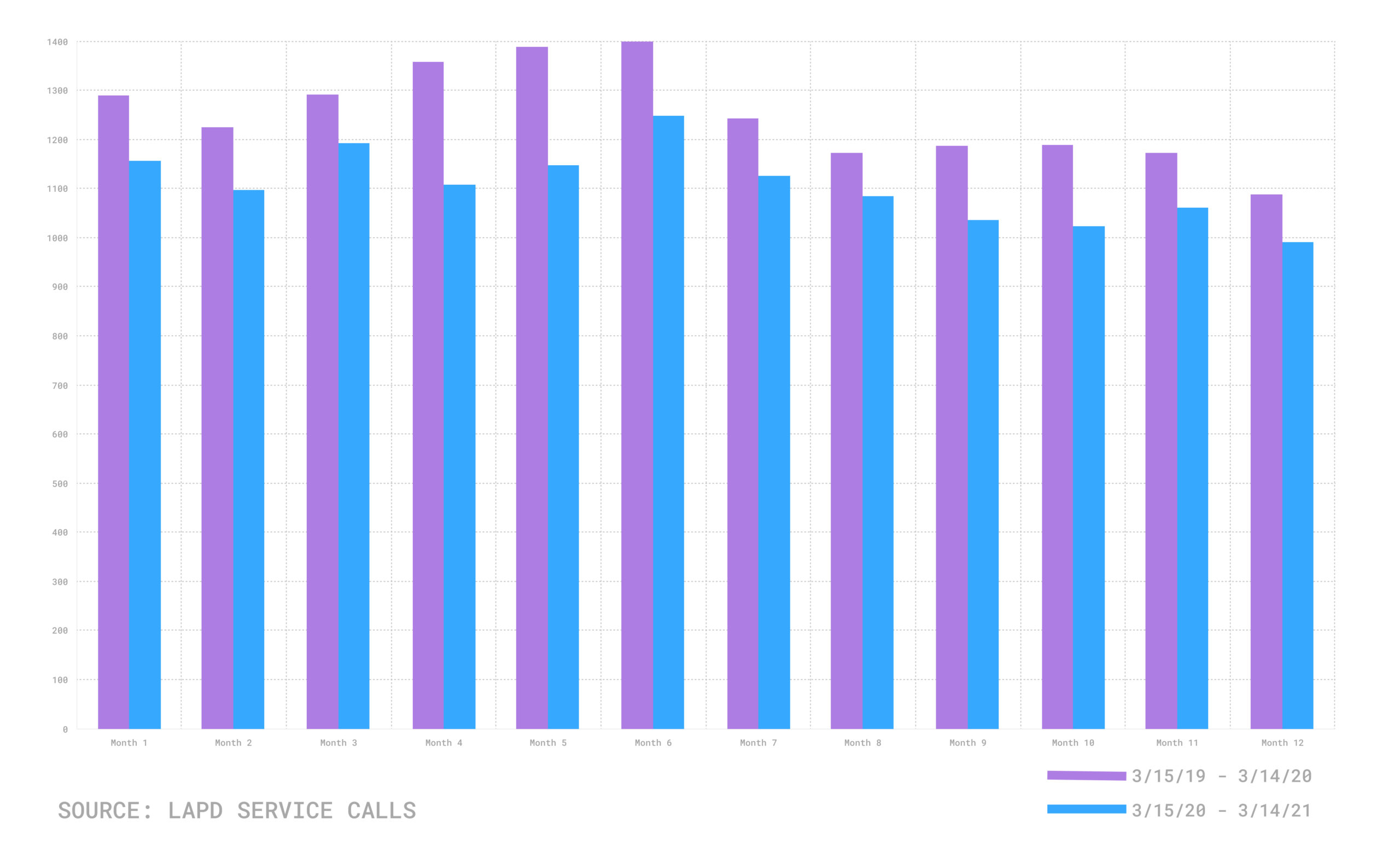Reports of domestic violence drop in Los Angeles during COVID-19

During the pandemic, the LAPD has responded to fewer calls about domestic violence, but experts worry the lockdown may have put victims in situations where they could not report their abusers.
From March 15, 2020 (when stay-at-home orders began to be put in place) through March 14, 2021, there were 13,268 intimate partner assaults reported to the LAPD, an 11% drop from the nearly 15,000 reported from March 15, 2019 – March 14, 2020.
Reported aggravated and simple assaults from an intimate partner

Intimate partner assault is a form of domestic violence. It includes both simple assault, which involves physical force, and aggravated assault, which may result in serious bodily harm.
During March, April and May of last year, when the city was locked down, there were roughly 1,300 incidents reported each month, compared with the roughly 1,100 reported each month during the previous year.
The recent decrease follows a four-year downward trend of intimate partner assaults in the city. Yet incidents of domestic violence often go unreported.
Det. Marie Sadanaga, the domestic violence coordinator for the LAPD, said she noticed the large drop and believes it is mostly due to victims not being able to call the police because the abuser is still in the home.
“We have heard from a few advocates that some victims who would normally report domestic violence after the fact are unable to make that report because front desks are closed,” said Sadanaga. “These victims can call the station or the non-emergency number to have officers respond to take a report, but may not be aware of that or they may start justifying/minimizing/denying what happened and ultimately decide not to report.”
Sadanaga said last summer that many victims end up going to shelters and never call the police. She added that domestic violence victims may not recognize abuse as violence due to cultural differences and some individuals may not report to the police because they may be concerned about the risk of deportation.
From March 15, 2020 – March 14, 2021, the LAPD also received 32,101 calls for service related to domestic violence, a nearly 21% decrease from the previous year. Service calls are a record of all instances in which the LAPD responds, including calls that come through 911, calls to non-emergency numbers and incidents observed in the field.
Despite fewer incidents reported to the LAPD in the past year, the Los Angeles County Department of Public Health’s Domestic Violence Council Hotline saw an increase every month of 2020, compared with 2019. By December, calls were still coming in 32% higher than the previous year, according to ABC7 Los Angeles.
A change in state law may help survivors moving forward. In September, Gov. Gavin Newsom signed SB 1141, a bill sponsored by Sen. Susan Rubio (D-Baldwin Park) that criminalizes intimidation and threats meant to frighten victims. The bill was sponsored by the Los Angeles City Attorney’s office and had the support of many domestic violence advocates.
“This legislation will help empower survivors of crime and abuse to speak out against their abusers and provide them more time to seek justice,” said Newsom in a statement in September. “California is committed to protecting survivors and supporting them and the organizations that provide them with essential services, especially during this challenging time.”
Sen. Rubio told Spectrum News that the bill will help survivors use the pattern of abuse they received as part of their testimony in court.
If you need help:
24-hour assistance is available through NODVLA for those suffering from domestic violence.
The National Domestic Violence Hotline: 800-799-7233
How we did it: We examined publicly available LAPD data on reported incidents of both simple and aggravated intimate partner assault as well as calls for service in the City of Los Angeles from March 15, 2017 – March 14, 2021. For neighborhood boundaries, we rely on the borders defined by the Los Angeles Times. Learn more about our data here.
LAPD data only reflects crimes that are reported to the department, not how many crimes actually occurred. In making our calculations, we rely on the data the LAPD makes publicly available.
Want to know how your neighborhood fares? Or simply just interested in our data? Email us at askus@xtown.la.






